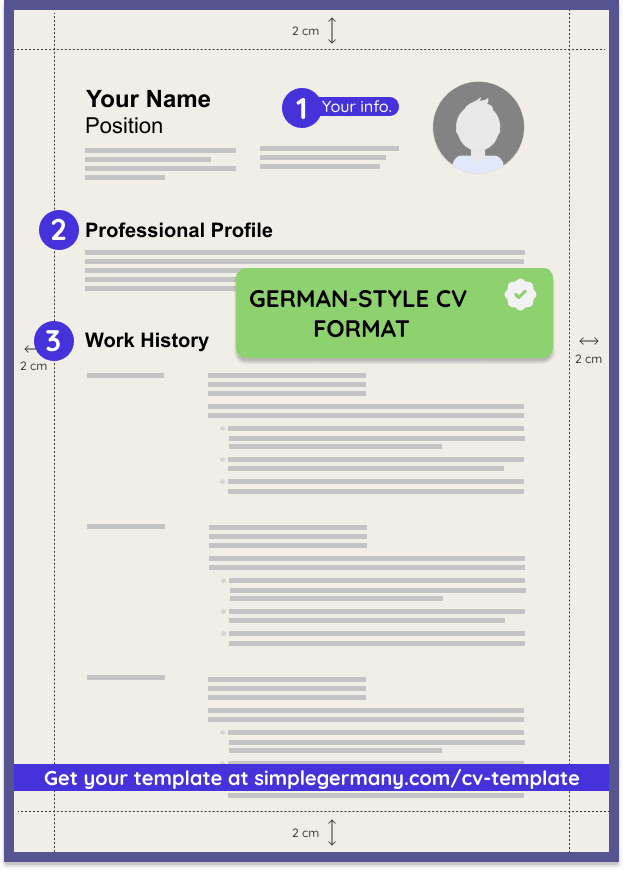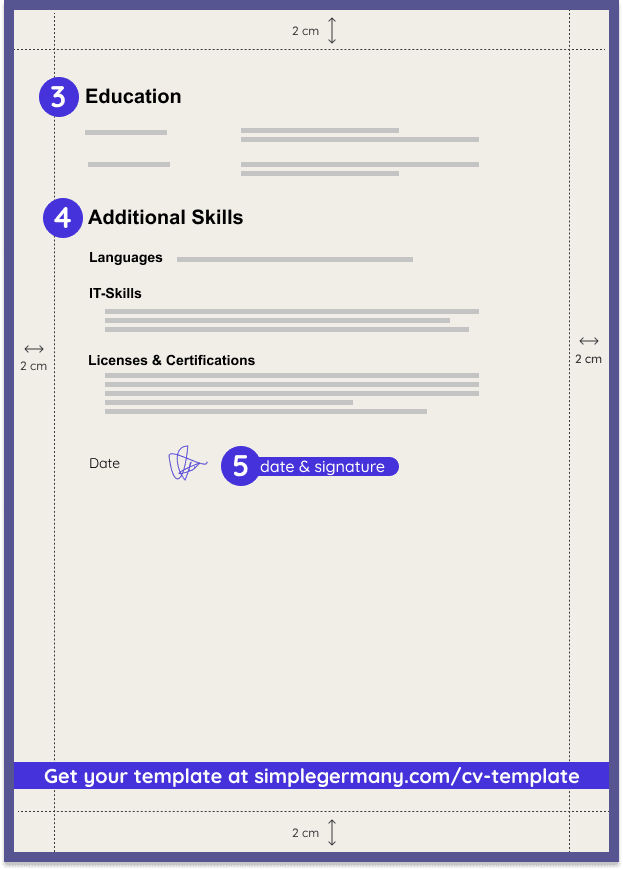
If you’re searching for a German-style CV in English that will increase your chances of nailing more job interviews in Germany, then you’ve come to the right place!
In this guide, you will find tips for creating a CV that follows the German format, as well as the chance to purchase our German CV template in English that you can use on your next job application.
According to a recent study done by Stepstone, 91% of HR recruiters name the CV as the most important document of an application.
Recruiters and HR spend less than 30 seconds scanning a CV before deciding whether it goes to the next round or not.


If you don’t want to spend time designing your own CV, you can download our German-Style CV template in English from our shop.
Proven Success!
The expectation of a German recruiter might be different than what you are used to.
The German CV (Lebenslauf) is considered less of a marketing product and more of a factual document. You are encouraged to write real, hard facts and avoid all kinds of fluff or self-promoting sentences. HR departments in Germany prefer the KISS method: Keep It Short & Simple.
In Germany, a CV is between one and a maximum of two pages and has five or six sections. Let’s explore each one in more detail.
The minimum personal details you should include in this section are your name and your address. German recruiters expect to see a few more personal details about you, though. So if you don’t add all the personal information described below, be prepared to answer some similar questions during your interviews.
Just like in many other countries, it is illegal for companies to reject an application based on gender, age, race, or sexual orientation.
Most Germans include additional personal information in their CV. As an expat, it is important to understand how this extra information might help you in your application.
Additionally, feel free to add professional social networks, such as LinkedIn or the German Xing. If you are a techy, you must include your GitHub!
Start with your most recent job and highlight relevant experience for the position you are applying. For each position, make sure to include the:
Germans like to read ‘gapless’ curriculum vitae. So if you took a year off between your jobs to travel, you should mention this in your CV. Any gap above three months is worth mentioning in your CV.
Also, you are encouraged to mention any voluntary work you have done.
“Context is critical! That’s why ‘Work Experience’ is the most important part of a CV. It’s the part that we learn where and how you have applied the skills listed elsewhere in a CV.”
by Jamie Rogers, Tech Recruiter in Germany in Darwin Recruitment
This section should have your education, including secondary and higher education. You should list your latest education degree first. Each degree should include:
Use this section to list any other relevant qualifications or skills to the role. Some examples of what you can include are:
Read Our Related Guide
In this optional section, you can feel free to include any hobbies or interests that might be relevant to the position. Remember, Germans love facts, so if you add this section, make it short and sweet.
Also, try to be specific about your interests. Travel is very generic, and almost everyone loves to do it.
Bonus points if you add this to your CV. Germans usually sign their CV with the date and their name.
Once you have created your CV, download it as a PDF and then digitally sign it by using a tool like Smallpdf.
If you are applying for an English-speaking job, it is a good idea to write your CV in English. Since you are applying for a job in Germany, chances are a German person will look over your CV. If you are learning German, you can write your CV in English and indicate in the language section that you are currently learning the language.
Read Our Related Guide
If your German level is good enough, go for it! Just a word of caution, though: Germans, like any other sane person, dislike typos and grammatical errors. So you better have a native German proofread your CV. Also, make sure only to do this if your German is good enough to handle the interview in German as well. If you create your CV in German, you are already setting the expectations for your future employer that you have good German skills.
Regardless of the language you choose for your CV, make sure to follow the standards German hiring managers expect.
In this guide, you learned that a CV in Germany is a one to two-page factual document, and it is not used as a promotional tool. You can add your soft skills and other details of your experience in your cover letter.
Read Our Related Guide
German recruiters and employers expect to receive an application free of typos and grammatical mistakes. So only send your CV in German if you are truly confident with the language.
Download our German-Style CV template in English from our shop to save you time and clear all potential doubts about what to include in your resume for the German job market.
Proven Success!
Remember only to include information that is relevant to your role and the job requirements. Now, it is time for you to scout the job market in Germany and get your dream job.
Happy job hunting!
About the Author
Jen Palacios is a researcher and writer at Simple Germany specializing in aiding international skilled workers to navigate the complexities of German life.
Jen brings a unique immigrant perspective to her writing. Beyond her professional pursuits, Jen is an avid learner with interests ranging from woodworking to web development.
She is committed to writing guides and producing YouTube videos for Simple Germany that provide practical guidance for internationals aiming to settle into life in Germany more smoothly.